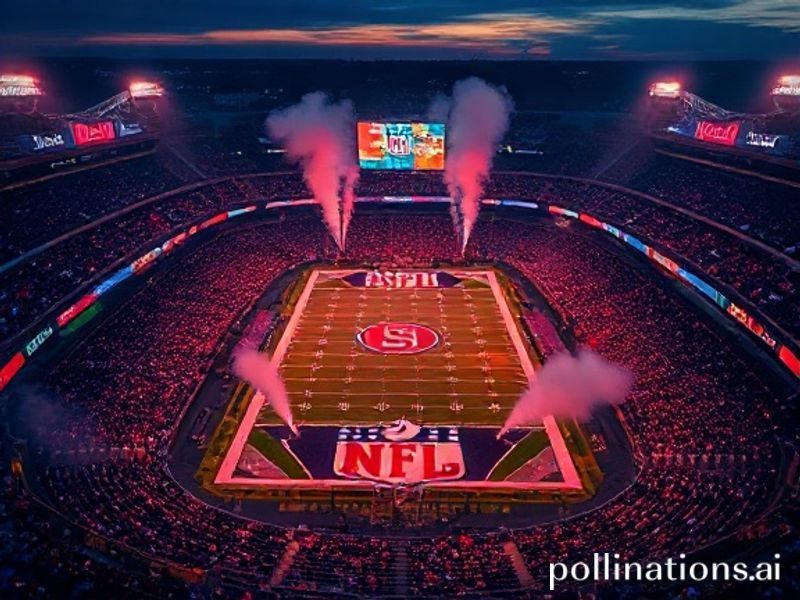Thirty-Two Flags: How the NFL Became the Empire You Didn’t Notice
The NFL’s Thirty-Two Flags: How a Provincial Pastime Conquered the Planet and Forgot to Apologize
By Correspondent M. A. “Mac” Guffin, filing from a hotel bar in Singapore that still thinks the Super Bowl is a plumbing fixture.
When the Kansas City Chiefs lifted their third Lombardi Trophy in February, fireworks crackled over Manila, Lagos, and even Reykjavik—places where “football” still means the game you play without helmets or existential dread. How, one wonders between sips of duty-free Glenlivet, did a league whose teams are nicknamed after a meat packer, a color rush, and a 19th-century poem become the de-facto global religion of Sunday insomnia?
The short answer is imperial overreach dressed up as streaming rights. The longer answer involves the peculiar alchemy of American soft power: take a sport designed for commercial breaks, wrap it in fighter-jet flyovers, then beam it into 190 countries via a constellation of satellites that the Pentagon pretends are for weather. Sprinkle in fantasy apps that let a teenager in Jakarta bench your starting running back, and voilà—cultural hegemony with a side of wings.
Overseas, the league’s marketing department insists on calling regular-season games in Frankfurt and Tottenham “global showcases,” as if the Raiders are a UNESCO site. Meanwhile, the locals—politely—treat these pilgrimages like visiting in-laws: curious, vaguely charmed, and quietly relieved when the circus leaves town. The British tabloids feign outrage about “American football hooligans” who queue too politely for beer, while German fans have begun singing “Take Me Home, Country Roads” in flawless Bavarian accents, proving that irony, too, is now an export commodity.
Economically, the NFL is less a sports league than a petro-state that drills attention instead of oil. Its annual revenue ($18 billion and counting) exceeds the GDP of half the UN membership. Jersey sales in Seoul alone keep the Green Bay Packers’ balance sheet greener than their frozen tundra. And when Amazon pays $1 billion for Thursday nights, it isn’t buying touchdowns; it’s buying eyeballs already softened by decades of Hollywood endings. The league repackages those eyeballs back to advertisers who, in turn, sell us the deodorant we’ll need after screaming at fourth-and-long. It’s the circle of life, just with more truck commercials.
Diplomatically, the NFL operates like the Vatican with shoulder pads. When the league threatened to pull the 2021 draft from Cleveland over a local labor dispute, Ohio’s governor folded faster than the Jets in December. Compare that to the UN Security Council’s paralysis on anything harder than a climate resolution, and you begin to suspect Roger Goodell could broker Middle East peace if there were a merchandising cut. (Tie-in keffiyehs, anyone?)
Yet for all its planetary swagger, the NFL remains endearingly provincial. Teams still operate like medieval fiefdoms: billionaire owners who inherited the franchise from grandpa’s coal fortune, municipal stadium deals negotiated with the subtlety of a protection racket, and fans who measure civic pride in parking-lot bratwurst. The Dallas Cowboys—a team that hasn’t reached a conference championship since the Y2K bug—still call themselves “America’s Team,” a boast so delusional it could run for Congress.
Meanwhile, the darker metrics pile up: chronic traumatic encephalopathy exported alongside highlight reels; cheerleader pay disputes that would embarrass a Bangladeshi sweatshop; and a Washington Commanders rebrand so bland it feels like a hedge fund laundering reputations. None of it sticks, because the product is engineered to reset every Tuesday. As the rest of the world staggers from one actual crisis to another, the NFL offers a comforting 60-minute simulation where problems are solved by a well-timed blitz and the clock mercifully runs out.
So when the league plants its flag in São Paulo next season, remember: the game is no longer about moving chains but moving units—of merchandise, of streaming subscriptions, of geopolitical influence. Thirty-two franchises, thirty-two avatars of American myth, marching under foreign skies to remind us that while empires rise and fall, third-and-long is forever. And if the locals don’t yet grasp the infield fly rule—sorry, wrong empire—there’s always next season, conveniently packaged in five languages and a commemorative NFT.
Until then, keep your passports ready and your sarcasm fully inflated. The circus never really leaves; it just changes time zones.







